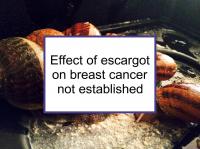Escargot (Helix pomatia) are land snails. They are a good source of protein while having a low fat content (consisting mostly of unsaturated fats, including alpha-linolenic acid and linoleic acid, which are present in proportions that depend on the snails' diets). However, escargot is a low saturated-fat food only if cooked and eaten without butter.
Breast cancer-related effects of eating escargot
Escargot snails can incorporate harmful compounds & organisms
Snails can accumulate cadmium (a breast carcinogen) and lead in their tissues if raised on soils incorporating heavy metals. Snails can also become contaminated with cadmium and other carcinogens by roadside vehicle exhaust fumes.
Commercially farm-raised escargot snails typically are fed a diet of ground cereals, which results in a less favorable fatty acid profile than that of "free range" snails. Farm-raised snails are also said to be more rubbery and tasteless than snails that have been allowed to roam over a patch of grass and vegetables. This may make farm-raised snails less desirable based on both a taste and nutrition.
However, since free range snails consume a variety of decayed matter, dead animals and insects, and a wide variety of leaves, their stomach contents can be harmful to humans and their digestive systems must be purged of such contents before cooking (often by feeding them a controlled diet for several days).
Poisoning by snails that had consumed oleander leaves has been reported. Cases of meningitis have been found to be caused by consumption of garden snails. In addition, snails must not be eaten raw; there have been reports of parasitic infections resulting from consumption of raw snail meat.
Escargot snail lectin HPA
The interest in escargot snails derives in part from their unique lectin, Helix pomatia agglutinin (HPA), that is used as a prognostic indicator for some cancers, including breast cancer. Lectins, a group of glycoproteins found in animal as well as plant cells, are sometimes used as differentiating markers to study cancers and metastatic cell lines. Changes in glycosylation of cell membranes play an important role in the metastatic behavior of tumor cells.
Carbohydrate residues of the membrane glycoproteins can be detected using certain lectins due to the fact that the lectins bind specifically to these carbohydrates. HPA recognizes α-D-N-acetylgalactosamine-containing epitopes (parts of macromolecules recognized by the immune system) which are only present in cancer cell lines having a high likelihood to undergo metastasis. HPA fixation on histological preparations of breast cancer tissues is associated with an ominous prognosis. One study reported that HPA itself has the potential to promote breast cancer metastasis through increased vascular invasion and lymph node involvement.
Giant African land snail lectin
A different lectin from the giant African land snail (Achatina fulica) has been found to cause apoptosis (programmed cell death) in human breast cancer cells. However, evidence concerning the giant African land snail and the fact that a component of escargot snails binds specifically to aggressive breast cancer cells does not mean that consuming escargot will help prevent breast cancer. No population studies have been performed to test the hypothesis that consuming escargot is associated with reduced breast cancer risk.
Additional comments
Sourcing or purchasing escargot
Although customary in some areas of Europe, it appears unwise for inexperienced consumers to collect and consume garden snails (typically, Helix aspersa) or snails found in other natural settings. French restaurants and specialty stores normally are the best sources of escargot. Consumers preparing their own escargot or other snails should be aware of their source and assure themselves of their freshness and safety.
Escargot, breast cancer and blood type
Escargot are considered good protection against breast cancer for individuals with type A or type AB blood type by some alternative health practitioners. This theory appears to be based in part on the fact that the escargot lectin will recognize blood group A antigen. The assumption is that HPA can expose the cancerous cells, thereby making them more available and susceptible to attack by antibodies of the blood type. However, we have not found any scientific studies that support this theory.
Note that while we are continually searching for new evidence specifically concerning this food, there is not much interest in it among breast cancer researchers, so few studies are available.
